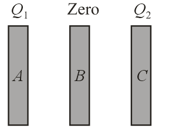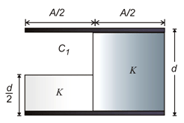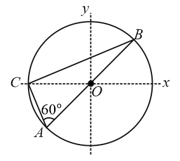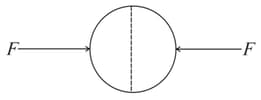EASY
JEE Main/Advance
IMPORTANT
Earn 100
An arrangement of three large metallic parallel plates with respective charges marked in figure is shown. What is the charge appearing on the left face of plate


(a)Zero
(b)
(c)
(d)
60% studentsanswered this correctly

Important Questions on Electrostatic Potential and Capacitance
MEDIUM
JEE Main/Advance
IMPORTANT
A parallel plate capacitor of area and plate separation is filled with two dielectrics as shown. What is the capacitance of the arrangement?

HARD
JEE Main/Advance
IMPORTANT
Positive and negative point charges of equal magnitude are kept at and , respectively. The work done by the electric field when another positive point charge is moved from to is
HARD
JEE Main/Advance
IMPORTANT
Consider a system of three charges and placed at points and , respectively, as shown in the figure. Take to be the centre of the circle of radius and angle .

MEDIUM
JEE Main/Advance
IMPORTANT
Consider a thin spherical shell of radius with its center at the origin, carrying uniform positive surface charge density. The variation of the magnitude of the electric field and the electric potential with the distance from the centre is best represented by which graph?
EASY
JEE Main/Advance
IMPORTANT
Consider a neutral conducting sphere. A positive point charge is placed outside the sphere. The net charge on the sphere is then
MEDIUM
JEE Main/Advance
IMPORTANT
Three concentric metallic spherical shells of radii are given charges respectively. It is found that the surface charge densities on the outer surfaces of the shells are equal. Then, the ratio of the charges given to the shells, is
MEDIUM
JEE Main/Advance
IMPORTANT
A long, hollow conducting cylinder is kept coaxially inside another long, hollow conducting cylinder of larger radius. Both the cylinders are initially electrically neutral.
MEDIUM
JEE Main/Advance
IMPORTANT
A uniformly charged thin spherical shell of radius carries uniform surface charge density of per unit area. It is made of two hemispherical shells, held together by pressing them with force (see figure). is proportional to

